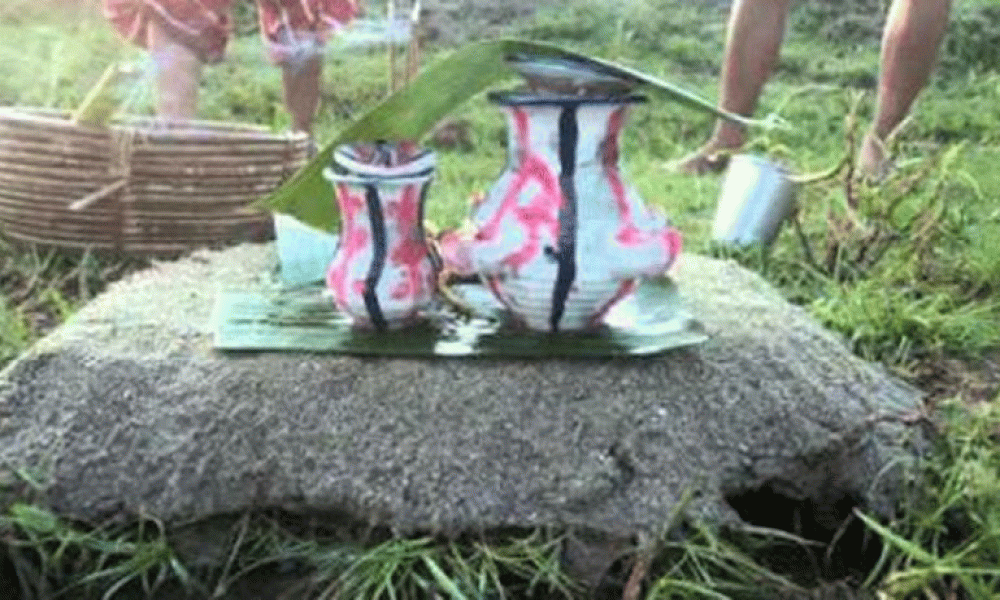Tejendra Tajpuriya
Tajpuriyas are indigenous people inhabiting the low-land in eastern Nepal. According to the 2011 census report, they have a population of 19,213. Besides eastern Nepal, they are also found in eastern Bihar, West Bengal and Assam.
Taj means crown in Nepali and Hindi languages. In Tajpuriya community, both brides and grooms wear crowns. Hence they are known as Tajpuriyas. They call themselves as descendants of the Hindu god Shiva and have their own language, culture and literature.
Religion
Tajpuriyas worship the nature. They do not worship the idols or keep images of any gods. However, they also venerate Thakur (Shiva), Bramhani (the snake god) and Hanuman (the monkey god).
Food
Tajpuriyas love seafood items like crab. Rassa, Fedgo, Kanji, Ghotol and Pelka are some curry items popular in Tajpuriya community. Steamed rice, lentil soup and fried potatoes are regular ingredients of Tajpuriya cuisine. Tajpuriya society is patriarchal, and women work in the kitchen.
Attire
Tajpuriyas live in tropical places, and wear thin clothes like Dhoti, Ganji and flip-flops. But in villages where the society is mixed, Tajpuriyas also wear modern clothes.
Ornaments
Tajpuriya women love to wear coin garlands. They also wear ornaments made of gold and silver like anklets and bangles. They also pierce their noses.
Festival
Siruwa is the most important festival in Tajpuriya society. They celebrate it in mid April with much fanfare. They also celebrate Dipawali, Holi, Dasain, Krishna Astami and Shiva Ratri festival.s
Birth ritual
The house where a baby is born is considered 'impure' in the Tajpuriya community. On the third day of the baby's birth, the house is cleaned and the courtyard is coated with cow dung and clay.
Marriage ceremony
Several types of marriage take place in Tajpuriya society. But the traditional type of arranged marriage is considered as the best. As per this tradition, the family of a would-be groom, accompanied by some relatives and respected villagers, visits the family of a prospective bride and puts forth marriage proposal. If the girl's guardians like the proposal, they visits the boy's family and sees the would-be groom. Once both sides agree, the boy and the girl are brought together. They garland each other and prepare for marriage. The traditional marriage takes place for three days.
The first day is called the day of Haldi (Turmeric). On this day, Tajpuriyas worship their gods and perform prayers. In the evening, relatives gather to smear Haldi (turmeric powder) on the bodies of the groom and the bride. Only married women are allowed to smear Haldi, others just sing and dance around.
On the second day, various types of medicinal herbs are fried in the fire, grinded properly and is dissolved in water. Relatives apply this water laced with herbal poweder on the bodies of the bride and the groom. And water is poured from a small clay vessle five times on the groom and then the bride. The bride and groom are also gifted with new clothes.
The third day is the crux of the three-day marriage ceremony. On this day, a procession begins from the groom's house. On the way, the groom is required to go around a mango tree five times. After the procession reaches the bride's house, the real marriage takes place. Several gods are invoked, prayers are performed and the bride is formally given to the bride during a ceremony. The procession returns with the bride. But on the way, the bride is also required to go around the same mango tree five times.
The next day, the bride's family comes and takes her back to her maternal home. And the next day, the groom's family again goes to the bride's house to take her back.
Death ceremony
In Tajpuriya community, dead bodies are often cremated. But bodies of children are buried. A dead body is often placed with the head to the north. The one who lights the pyre needs to mourn the death staying aloof for 11 days. On the fourth day, women take bath and are purified. On the tenth day, all other family members and relatives are purified. On the eleventh day, the one who lit the pyre is purified. On this occasion, alms are given to Brahmins in the name of the departed soul. On the eleventh evening, a shaman performs rituals to send the departed soul far away.
(The writer is the coordinator of Tajpuriya page in Gorkhapatra daily).









